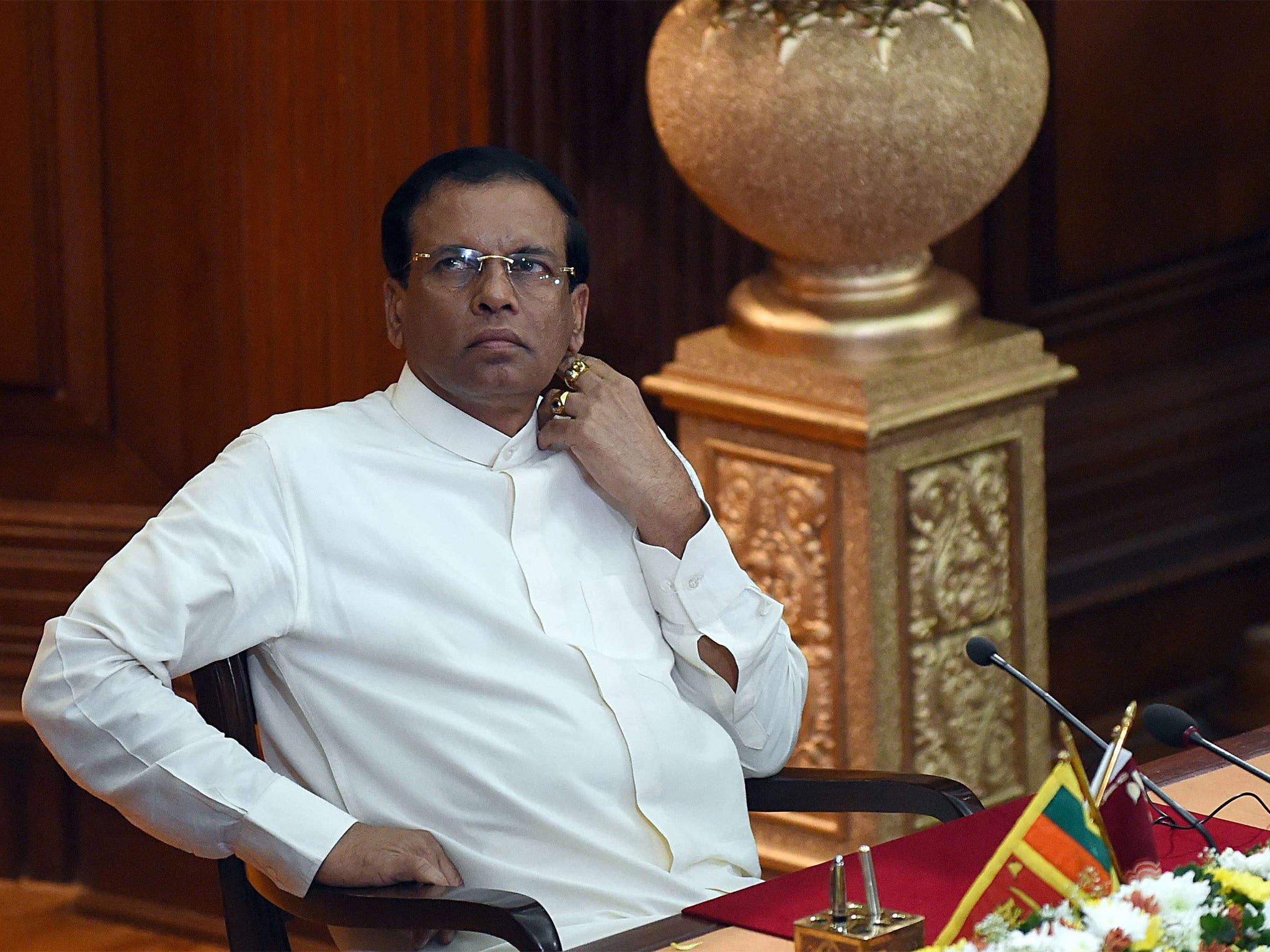Tamil protesters call for Sri Lankan President Maithripala Sirisena to be tried for war crimes and genocide committed during civil war
On the eve of a delayed UN report into the bitter conflict, Tamils are on the march calling for justice from the international community

“I’m looking for my daughter, my daughter-in law and two little grandchildren who disappeared during the war,” says Sivaneswari, rubbing her arthritic legs as she rests after a five-day protest march across the northern tip of Sri Lanka. “I have faith they are still alive.”
Like Sivaneswari, 63, most of the bedraggled Tamil protesters from Sri Lanka’s biggest ethnic minority community, holding up photographs of their missing family members and placards calling for a war crimes investigation into the tiny island, are women. And six years after a three-decade war, they are old and they are tired.
The duo leading the protest march are the wife of a “missing” Tamil Tiger terrorist chief who was responsible for hundreds of child soldier conscriptions and a cousin of the Tiger supremo Velupilla Prabhakaran who ran a ruthless terrorist organisation replete with suicide bombers. Now, they are ready for another kind of battle – they want the international community to try the island’s Sinhalese leadership for war crimes.
“Maithripala Sirisena is a war criminal,” says Mahalingam Shivajilingam, a provincial council member and a cousin of Prabhakaran, referring to the current President. “And we demand that he be tried for war crimes and genocide against the Tamil people of this country.”

Allegations against Mr Sirisena are spurred by the fact that he served as Acting Defence Minister under the former president Mahinda Rajapaksa during the last two weeks of the war, where, according to the United Nations, more than 40,000 Tamils were killed. Sparing no one, Ms Shivajilingam accuses the Prime Minister Ranil Wickremesinghe, Mr Rajapaksa, his brother the former Defence Secretary Gotabhya Rajapaksa and the field marshal, Sarath Fonseka, who commanded the military during the final war years, of also being war criminals.
The protest in the former northern war zone is timed to coincide with an ongoing United Nations Human Rights Commission (UNHRC) investigation in Geneva, where the head of the organisation Zeid Ra’ad Al-Hussein will release a delayed report on Sri Lanka’s war crimes tomorrow. The report addresses alleged extra-judicial killings, rape of Tamils and bombing civilian “no fire zones” by the Sri Lankan military. Addressing a session in Geneva, Mr Al Hussein said that the report’s findings “are of the most serious nature”.
Mr Rajapaksa has refused to comment until the release of the report. Mangala Samaraweera, the Foreign Minister, told the human rights commission that Colombo will set up a truth and reconciliation commission modelled on post-apartheid South Africa to look into atrocities committed during the final phase of the war. But the Tamils call any effort of an internal investigation “an eyewash”.
“You cannot compare South Africa with us,” says Ananthi Shashitharan, the wife of the eastern Tiger chief who, she says, disappeared after surrendering to government troops. “We are not ready to trust any Sinhala government,” adds Manmohini, another woman with missing children. “We want justice for the ethnic cleansing that happened to us Tamils. For the 2009 and 1983 riots.”
The mistrust between the two communities goes beyond to the riots in 1983, when a faction of the majority Sinhalese killed more than 3,000 innocent Tamil civilians across the country. While the Government watched, Sinhalese rioters dragged out and shot, clubbed and stabbed Tamil men and women, burnt their homes and set aflame vehicles with entire families inside. The Tamils have always felt marginalised.
Tamil qualms go beyond the Government too. They blame the West, particularly the United States and the UN, for “watching while genocide was committed during the final phase of the war”.
“We are angry with the international community,” says Ms Shashitharan. “All of them, with their fancy satellite technology watched while we died by the thousands and now the US is backing out on its promise.”
The broken promise of the United States that the Tamils refer to has been America’s recent change of heart towards Sri Lanka following the new pro-West Government that came into power in January. After sponsoring and pushing for an anti-Sri Lankan resolution that called for an international investigation into the country’s war crimes, the US recently said it would adopt a “collaborative approach” where Sri Lanka would be allowed to conduct a domestic investigation.
“We don’t believe in domestic inquiries. We’ve been cheated by America,” says Rahumalar Thiruchchelvan, 52, a Tamil woman who joined the walk in protest against a probable softer UN report. “A change of presidents and governments doesn’t wipe out our losses,” she says.
Join our commenting forum
Join thought-provoking conversations, follow other Independent readers and see their replies
Comments
Bookmark popover
Removed from bookmarks